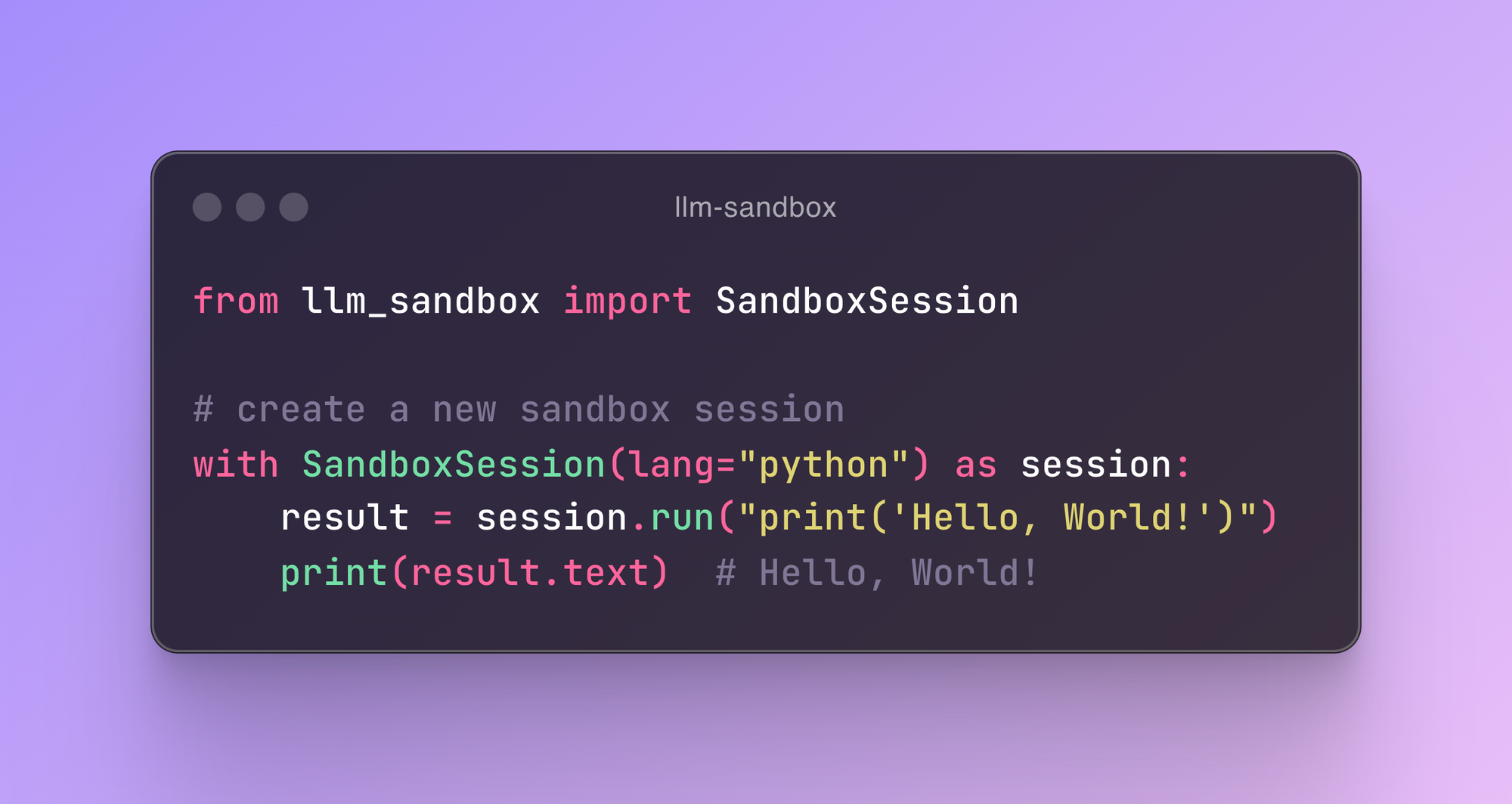Securely Execute LLM-Generated Code with Ease
LLM Sandbox is a lightweight and portable sandbox environment designed to run large language model (LLM) generated code in a safe and isolated manner using Docker containers. This project aims to provide an easy-to-use interface for setting up, managing, and executing code in a controlled Docker environment, simplifying the process of running code generated by LLMs.
- Easy Setup: Quickly create sandbox environments with minimal configuration.
- Isolation: Run your code in isolated Docker containers to prevent interference with your host system.
- Flexibility: Support for multiple programming languages.
- Portability: Use predefined Docker images or custom Dockerfiles.
- Scalability: Support Kubernetes and remote Docker host.
- Ensure you have Poetry installed.
- Add the package to your project:
poetry add llm-sandbox # or poetry add llm-sandbox[kubernetes] or poetry add llm-sandbox[podman] or poetry add llm-sandbox[docker]- Ensure you have pip installed.
- Install the package:
pip install llm-sandbox # or pip install llm-sandbox[kubernetes] or pip install llm-sandbox[podman] or pip install llm-sandbox[docker]See CHANGELOG.md for more details.
The SandboxSession class manages the lifecycle of the sandbox environment, including the creation and destruction of Docker containers. Here's a typical lifecycle:
- Initialization: Create a
SandboxSessionobject with the desired configuration. - Open Session: Call the
open()method to build/pull the Docker image and start the Docker container. - Run Code: Use the
run()method to execute code inside the sandbox. Currently, it supports Python, Java, JavaScript, C++, Go, and Ruby. See examples for more details. - Close Session: Call the
close()method to stop and remove the Docker container. If thekeep_templateflag is set toTrue, the Docker image will not be removed, and the last container state will be committed to the image.
from llm_sandbox import SandboxSession
# Create a new sandbox session
with SandboxSession(image="python:3.9.19-bullseye", keep_template=True, lang="python") as session:
result = session.run("print('Hello, World!')")
print(result)
# With custom Dockerfile
with SandboxSession(dockerfile="Dockerfile", keep_template=True, lang="python") as session:
result = session.run("print('Hello, World!')")
print(result)
# Or default image
with SandboxSession(lang="python", keep_template=True) as session:
result = session.run("print('Hello, World!')")
print(result)LLM Sandbox also supports copying files between the host and the sandbox:
from llm_sandbox import SandboxSession
with SandboxSession(lang="python", keep_template=True) as session:
# Copy a file from the host to the sandbox
session.copy_to_runtime("test.py", "/sandbox/test.py")
# Run the copied Python code in the sandbox
result = session.execute_command("python /sandbox/test.py")
print(result)
# Copy a file from the sandbox to the host
session.copy_from_runtime("/sandbox/output.txt", "output.txt")from llm_sandbox import SandboxSession
pod_manifest = {
"apiVersion": "v1",
"kind": "Pod",
"metadata": {
"name": "test",
"namespace": "test",
"labels": {"app": "sandbox"},
},
"spec": {
"containers": [
{
"name": "sandbox-container",
"image": "test",
"tty": True,
"volumeMounts": {
"name": "tmp",
"mountPath": "/tmp",
},
}
],
"volumes": [{"name": "tmp", "emptyDir": {"sizeLimit": "5Gi"}}],
},
}
with SandboxSession(
backend="kubernetes",
image="python:3.9.19-bullseye",
dockerfile=None,
lang="python",
keep_template=False,
verbose=False,
pod_manifest=pod_manifest,
) as session:
result = session.run("print('Hello, World!')")
print(result)import docker
from llm_sandbox import SandboxSession
tls_config = docker.tls.TLSConfig(
client_cert=("path/to/cert.pem", "path/to/key.pem"),
ca_cert="path/to/ca.pem",
verify=True
)
docker_client = docker.DockerClient(base_url="tcp://<your_host>:<port>", tls=tls_config)
with SandboxSession(
client=docker_client,
image="python:3.9.19-bullseye",
keep_template=True,
lang="python",
) as session:
result = session.run("print('Hello, World!')")
print(result)from kubernetes import client, config
from llm_sandbox import SandboxSession
# Use local kubeconfig
config.load_kube_config()
k8s_client = client.CoreV1Api()
with SandboxSession(
client=k8s_client,
backend="kubernetes",
image="python:3.9.19-bullseye",
lang="python",
pod_manifest=pod_manifest, # None by default
) as session:
result = session.run("print('Hello from Kubernetes!')")
print(result)from llm_sandbox import SandboxSession
with SandboxSession(
backend="podman",
lang="python",
image="python:3.9.19-bullseye"
) as session:
result = session.run("print('Hello from Podman!')")
print(result)from typing import Optional, List
from llm_sandbox import SandboxSession
from langchain import hub
from langchain_openai import ChatOpenAI
from langchain.tools import tool
from langchain.agents import AgentExecutor, create_tool_calling_agent
@tool
def run_code(lang: str, code: str, libraries: Optional[List] = None) -> str:
"""Run code in a sandboxed environment with security checks."""
with SandboxSession(
lang=lang,
strict_security=True,
resource_limits=ResourceLimits(
max_cpu_percent=50.0,
max_memory_bytes=256 * 1024 * 1024
)
) as session:
return session.run(code, libraries).text
# Use in your agent
llm = ChatOpenAI(model="gpt-4", temperature=0)
agent = create_tool_calling_agent(llm, [run_code], prompt)from llama_index.core.tools import FunctionTool
from llama_index.core.agent import FunctionCallingAgentWorker
code_execution_tool = FunctionTool.from_defaults(
fn=run_code,
name="run_secure_code",
description="Run code securely in an isolated environment"
)
agent_worker = FunctionCallingAgentWorker.from_tools(
[code_execution_tool],
llm=llm,
verbose=True
)We welcome contributions! Here are some areas we're looking to improve:
- Add support for more programming languages
- Enhance security scanning patterns
- Improve resource monitoring accuracy
- Add more AI framework integrations
- Implement container pooling for better performance
- Add support for distributed execution
- Enhance logging and monitoring features
This project is licensed under the MIT License. See the LICENSE file for details.
See CHANGELOG.md for a list of changes and improvements in each version.




